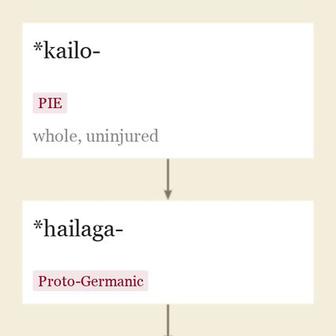holily (adv.)
约于1200年,源自 holy(形容词)和 -ly(2)。
holily 的相关词汇

古英语 halig "神圣的,祝圣的,圣洁的; 虔诚的; 教会的",源自原始日耳曼语 *hailaga-(也源自古诺尔斯语 heilagr,丹麦语 hellig,古弗里斯兰语 helich "神圣的",古撒克逊语 helag,中古荷兰语 helich,古高地德语 heilag,德语 heilig,哥特语 hailags "神圣的"),源自原始印欧语 *kailo- "完整的,未受损伤的"(参见 health)。在拉丁语 sanctus 的转化中被采用。
主要(基督教之前)的意义无法确定,但可能是"必须保持完整或完好,不能违反或侵犯",并与古英语 hal(参见 health)和古高地德语 heil "健康,幸福,好运"(德语问候语 Heil 的来源)相关。Holy water 在古英语中存在。
Holy is stronger and more absolute than any word of cognate meaning. That which is sacred may derive its sanction from man ; that which is holy has its sanctity directly from God or as connected with him. Hence we speak of the Holy Bible, and the sacred writings of the Hindus. He who is holy is absolutely or essentially free from sin; sacred is not a word of personal character. The opposite of holy is sinful or wicked; that of sacred is secular, profane, or common. [Century Dictionary, 1895]
神圣比任何同义词更强烈和绝对。那些神圣的事物可能是从人那里获得认可; 而那些神圣的事物直接来自上帝或与上帝有关。因此,我们谈论圣经和印度教的神圣文献。那些神圣的人绝对或本质上没有罪恶; 神圣不是一个人的性格词。神圣的对立词是有罪的或邪恶的; 神圣的对立词是世俗的,亵渎的或普通的。[世纪词典,1895]
从1837年开始, Holy 被用作强调词; 在1880年代以来,它被用作感叹词(例如 holy smoke,1883年, holy mackerel,1876年, holy cow,1914年, holy moly 等),其中大部分是对 holy Christ 或 holy Moses 的委婉说法。Holy Ghost 在古英语中存在(在中古英语中通常写成一个词)。Holy League 用于各种欧洲联盟; Holy Alliance 是1815年由俄罗斯、奥地利和普鲁士君主亲自组成的; 它在1830年结束。
常见的副词后缀,由形容词构成副词,表示“以形容词所表示的方式”,中古英语,源自古英语 -lice,源自原始日耳曼语 *-liko-(同源词:古弗里西亚语 -like,古撒克逊语 -liko,荷兰语 -lijk,古高地德语 -licho,德语 -lich,古诺尔斯语 -liga,哥特语 -leiko); 参见 -ly(1)。同源词有 lich,与形容词 like 相同。
Weekley 指出,日耳曼语使用一个基本上意味着“身体”的词来构成副词,而罗曼语使用一个意味着“心灵”的词(如法语 constamment 源自拉丁语 constanti mente)。现代英语形式出现在中古英语晚期,可能受到古诺尔斯语 -liga 的影响。